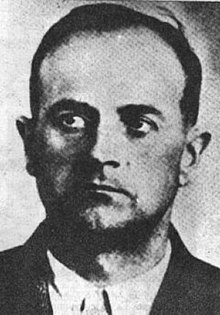Eduard Roschmann
Eduard Roschmann alias F (r) ederico Wegener alias butcher of Riga (born November 25, 1908 in Graz , † August 10, 1977 in Asunción / Paraguay ) was commandant of the Riga ghetto and the Riga Imperial Forest concentration camp .
Life
From 1927 to 1934 Roschmann was a member of the Styrian Homeland Security and the Fatherland Front . In 1938 he joined the NSDAP and the SS .
From January 1941 Roschmann worked first in the Reich Security Main Office with the Security Service , later in Division IV ( Gestapo ) with the Commander of the Security Police and the SD in Latvia . He was a member of Einsatzgruppe A and, from the end of 1941, was a “ Judenreferent ” in the Riga ghetto . From 1943 he was a ghetto commander and as such was notorious as the "butcher of Riga". In 1944, the Jews murdered there were burned as part of Sonderaktion 1005 in order to remove traces.
Before the approaching Soviet front , the SS occupation of the ghetto fled Riga in October 1944 in the direction of the still safe Danzig . From there, Roschmann and some other SS members went to southern Germany in the direction of the Austrian border. He took off his SS uniform and tried to hide in Wehrmacht clothing. During a check behind the Austrian border, Roschmann was shot while trying to escape. Then he hid with friends in the Graz area until mid-1945. After his recovery he went into hiding again, using his false papers to hide among other prisoners of war.
After his release in 1947, Roschmann became careless and visited his wife in Graz. Recognized by former concentration camp inmates, he was arrested by the British military police. However , he managed to escape on the transport to the Dachau internment camp . He left Austria over the " Green Border " to Italy . There he received a new passport in the name of Federico Wegener from the Red Cross in 1948 . He managed to escape from Genoa to Argentina via one of the so-called rat lines .
Roschmann founded a wood import-export company in Argentina and married, although he was not divorced from his first wife. When he founded a company branch in the Federal Republic of Germany with his second wife in 1958 , his first wife, who had not known anything about the second wife until then, reported him to the Graz Regional Court for bigamy .
After his return to Buenos Aires , Roschmann received the Argentine citizenship in 1968 . In July 1977, an Argentine arrest warrant was issued against Roschmann based on an extradition request from the Hamburg public prosecutor . Roschmann managed to escape to Paraguay , where he died on August 10 in Asunción .
Frederick Forsyth made Roschmann a main character in his novel The Odessa Files , published in 1972 , in which he is portrayed as an important actor in the fictional " organization of former SS members ". The fictional character Roschmann has little in common with the real person.
See also
literature
- Ernst Klee : The dictionary of persons on the Third Reich. Who was what before and after 1945. S. Fischer, Frankfurt 2003, ISBN 3-10-039309-0 .
- Heinz Schneppen: Ghetto Commander in Riga - Eduard Roschmann: Facts and Fictions. Metropol, Berlin 2009, ISBN 3-938690-93-3 .
- Daniel Stahl: Nazi Hunt. South America's dictatorships and the prosecution of Nazi crimes . Wallstein, Göttingen 2013
Web links
- Nazis on the run (part 5) on stern.de
| personal data | |
|---|---|
| SURNAME | Roschmann, Eduard |
| ALTERNATIVE NAMES | Wegener, Frederico; Wegener, Federico; Butcher of Riga |
| BRIEF DESCRIPTION | Austrian war criminal in Latvia, timber importer and exporter |
| DATE OF BIRTH | November 25, 1908 |
| PLACE OF BIRTH | Graz |
| DATE OF DEATH | August 10, 1977 |
| Place of death | Asunción |
